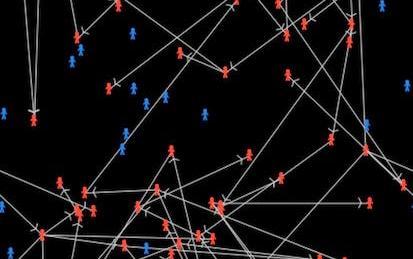

دوراتنا

Computer Simulations
Big data and artificial intelligence get most of the press about computational social science, but maybe the most complex aspect of it refers to using computational tools to explore and develop social science theory. This course shows how computer simulations are being used to explore the realm of what is theoretically possible. Computer simulations allow us to study why societies are the way they are, and to dream about the world we would like to live in. This can be as intuitive as playing a video game.
-
Course by

-
 Self Paced
Self Paced
-
 13 ساعات
13 ساعات
-
 الإنجليزية
الإنجليزية

Introducing Cellular Automata
In this hands-on guided project you will be introduced to the wonders of Cellular Automata, a powerful modeling framework for the exploration of inter-scale dynamics. That is, how do simple local level rules give rise to global pattern formation and self-organization?
You will explore questions like this with the help of Golly and NetLogo, two rich simulations softwares for the creation of CA and agent-based models. Moreover, you will be exposed to cutting edge applications of Cellular Automata in the fields of Biology (Morphogenesis) and Physics.
-
Course by

-
 Self Paced
Self Paced
-
 3 ساعات
3 ساعات
-
 الإنجليزية
الإنجليزية

Systems Science and Obesity
Systems science has been instrumental in breaking new scientific ground in diverse fields such as meteorology, engineering and decision analysis. However, it is just beginning to impact public health. This seminar is designed to introduce students to basic tools of theory building and data analysis in systems science and to apply those tools to better understand the obesity epidemic in human populations. There will also be a lab in which students will use a simple demonstration model of food acquisition behavior using agent-based modeling on standard (free) software (netlogo).
-
Course by

-
 Self Paced
Self Paced
-
 الإنجليزية
الإنجليزية

Introduction to Complexity Science
This course explores the features of complexity science. Our world is connected by an abundance of complex systems. Across all levels of organizations from physical, biological world to the social world, we may think of the connectivity between individual elements and how they interact and influence each other. For example, how humans transmit pandemics within a group, how cars interact in the traffic system and how networks connect in governmental organizations. Although these systems are diverse and different, they have surprisingly huge features in common.
-
Course by

-
 Self Paced
Self Paced
-
 17 ساعات
17 ساعات
-
 الإنجليزية
الإنجليزية

Introduction to Agent-based Modeling with NetLogo
In this 2-hour long project-based course, you will create an agent-based model (ABM) that simulates the spread of a hypothetical virus through close contact between agents in a virtual world. By doing so, you will learn about the wonders of agent-based modeling as a paradigm, as well as the basics of NetLogo - one of the most famous and powerful simulation environments in this realm.
-
Course by

-
 Self Paced
Self Paced
-
 2 ساعات
2 ساعات
-
 الإنجليزية
الإنجليزية

Network Dynamics of Social Behavior
How do revolutions emerge without anyone expecting them? How did social norms about same sex marriage change more rapidly than anyone anticipated? Why do some social innovations take off with relative ease, while others struggle for years without spreading? More generally, what are the forces that control the process of social evolution –from the fashions that we wear, to our beliefs about religious tolerance, to our ideas about the process of scientific discovery and the best ways to manage complex research organizations? The social world is complex and full of surprises.
-
Course by

-
 Self Paced
Self Paced
-
 5 ساعات
5 ساعات
-
 الإنجليزية
الإنجليزية



